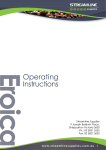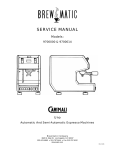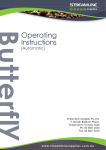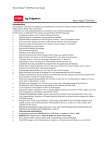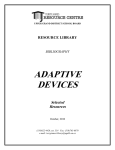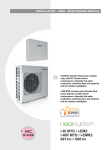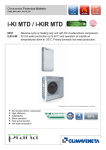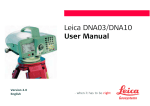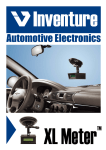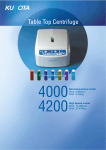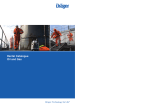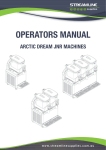Download Carmen Operating Instructions
Transcript
Carmen Operating Instructions Streamline Supplies 9 Joseph Baldwin Place, Shepparton Victoria 3630 Ph: 03 5831 5555 Fax: 03 5821 3633 www.streamlinesupplies.com.au 1 Introduction Please read this technical handbook carefully since it provides important information on the correct installation, use and maintenance. Keep this handbook in a safe place for further consultation. The Manufacturer is not responsible for any damage caused by incorrect or unreasonable use and maintenance. The Manufacturer accepts no responsibility for damage to persons or objects caused by incorrect installation. The instructions in this handbook are in no way a substitute for the safety instructions and technical data on the machine or the packaging concerning installation and function. This handbook is an essential part of the machine. For further information or additional handbooks, please contact your distributor or the manufacturer. This handbook reflects the current manufacturing requirements and is subject to change according to future modifications. The Manufacturer is free to modify this manual without updating previous editions except in exceptional cases. This machine is to be operated according to the instructions supplied in the handbook by a responsible adult operator, installation and/or service technician. www.streamlinesupplies.com.au 2 Instructions for use This machine is designed for the sole purpose of producing coffee, hot water and steam for hot drinks. All other uses are incorrect and, therefore, dangerous. This machine is designed for professional use only. The machine components are made of nontoxic and long lasting parts which are easily accessed for cleaning and maintenance. The end user must be an adult, sufficiently trained to operate the appliance properly and must forbid the use of the appliance to children or non-responsible persons. To ensure efficient and correct operation it is essential to follow the Manufacturer’s instructions concerning the periodic maintenance carried out by authorized technicians in compliance with the local standards and laws. The installation technician, the user and the person in charge of maintenance are obliged to inform the manufacturer of any defects or damages which could effect the safety of the original installation. The installation technician must check the surrounding area to ensure safe and hygienic use are guaranteed. The machine components’ manufacturers are responsible for the parts supplied by them. The Customer is responsible for the personal use of the equipment. Do not expose the machine to environmental elements (sun, rain, etc.). When the machine is idle and not in use for an extended period of time, it should be emptied completely and stored in an area with temperature above freezing (0º C or 32º F). This prevents any possible damage to pipes and boiler. All maintenance procedures must be carried out exclusively by authorized technicians and all spare-parts must be genuine. Any modification or forcing performed by persons not authorized by the Manufacturer will void all warranties covering the appliance. The motor-pump set must be positioned away from hydraulic pipes, heat sources, electrical appliances or it must be protected by a water-resistant aerated enclosure. WARNING: Before performing tests and maintenance procedures DISCONNECT MACHINE FROM MAINS. Unplug the machine or turn off the main switch before cleaning the machines interior. The machine must be operated with filtered clean water. Use water softeners if the water has a high mineral content. Mineral deposits may obstruct the machine’s water circuit which may cause damage to the machine and possibly personal injury. Never use detergents of any kind. Other than approved back flushing detergent in group head. The machine must operate only with filtered drinking water. To reduce the risk of electrical shock, avoid operating the machine with wet hands or feet and do not operate the machine with bare feet. The machine must be switched off whenever unattended by the operator. Never pull the electrical supply cable. The machine has to be installed with an efficient earth; the Manufacturer recommends a wooden platform on which the operator can stand. Never touch coffee groups, spouts, steam and hot water pipes. They are HOT and could cause burns. Never operate the machine without water. Tea and coffee cups must be carefully drained before placing them over the cup-tray. The Mains pressure should be between 200 Kpa and 600 kpa. If higher then 600 kpa a pressure limiter must be fitted. www.streamlinesupplies.com.au 3 Espresso Coffee Machine Range Automatic Espresso coffee machine with microprocessor controlled volumetric dosing control & programming via digital keyboard. Automatic and manual boiler water refill is standard. Volumetric pump with motor for remote installation on 3 & 4 group machines. Machine available with 1 – 2 – 3 – 4 groups. Semi - Automatic Espresso coffee machine with manual (start/stop) dosing control. Automatic and manual water boiler refill is standard. Volumetric pump with motor. Machine available with: 1 – 2 – 3 groups. www.streamlinesupplies.com.au 4 Description of external components. Keyboard for coffee and hot water delivery control Attention: The 4 – group machine has two separate control circuits each controlling two groups; for this reason it is necessary to program the 1st group with the 2nd group and the 3rd group together with the 4th group. Steam Control knob Main Switch Steam Wand Pressure Gauge for boiler and pump pressure Steam Wand Push Button Panel Hot water outlet Boiler water level indication Automatic Semi-Automatic • Coffee delivery control key • Hot water delivery control key • 1 short coffee,1 normal coffee,1 long coffee • 2 short coffee - 2 normal coffee - 2 long coffee • Hot water delivery control key • Manual coffee delivery control Key www.streamlinesupplies.com.au 5 Function of the machine The main components of the espresso coffee machine are the following: BOILER Contains hot water and steam. HOT-WATER TAP This delivers hot water. COFFEE DELIVERY GROUP AND HEAT EXCHANGERS This is the component where the filter holder is inserted. The hot water enters the delivery group, where the processes of pre-infusion, infusion and delivery of the coffee take place. The machine comes with one heat exchanger for each delivery group. The heat exchanger is fitted in the boiler and it’s purpose is to heat up the fresh water coming from the mains to the correct temperature.. CONTROL & MONITORING DEVICES Pressure gauge • Indicates the boiler pressure and the working pressure of the pump. Pressure switch • This is used to keep the boiler water temperature constant by controlling the heating elements, based on the boiler pressure. Automatic Boiler • Water Level Control: Electronic circuitry used to keep the boiler water level constant. HEATING SOURCE An element warms the water in the boiler. ELECTRIC PUMP This component is to increase the water pressure of the mains to the correct water pressure needed for espresso coffee preparation which is 9 bar. STEAM WAND This wand delivers hot steam for milk frothing and steaming of drinks in jugs (milk, chai, chocolates, etc.) HYDRAULIC CIRCUIT The hydraulic diagram shows that the water used for the preparation of coffee comes directly from the mains and is heated in the heat exchangers inside the boiler. ATTENTION: In all cases, this appliance must be connected to a 3 pin power point or a hard wired (direct wired) power source. The use of extension leads or loose type connectors is strictly forbidden and unlawful. www.streamlinesupplies.com.au 6 Main Switch The machine is equipped with a main power supply switch with 3 positions. 1 0 2 Pos. 0 No power supply to internal components. 1 0 2 Pos. 2 Power supply to function components. 1 0 2 Pos. 1 Power supply to functional components and electric boiler heating elements. www.streamlinesupplies.com.au 7 Installation Warnings Please read carefully The Manufacturer has tried to foresee all possible safety devices to ensure the safety of the users. However, different conditions of installation or of equipment moving can cause situations which cannot be controlled or foreseen. Therefore, it’s absolutely necessary to evaluate all remaining risks and to care about the following suggestions: - This machine is safe only if appropriately connected to an efficient earth system complying with the safety standards in force in the state where the machine will be installed. The Manufacturer rejects any responsibility for accidents due to the missed application of the above standards, since a wrong installation may result in injuries to persons, as well as other problems that may effect other areas. - Do not leave packing items such as plastic bags, Styrofoam, nails etc. around because children or other persons could get injured. - Any defect or discrepancy must be notified immediately to the persons authorized for installation and maintenance of the machine. - Machine installation must be performed exclusively by authorized and qualified technicians. - Authorized service: if the service is not complying with the instruction of the Manufacturer, or is components other than those recommended by the Manufacturer will be used for installation or maintenance of the appliance, the conformity declaration of the product will be voided, and so the Manufacturer’s responsibility - Possible replacement of the supply cable, if damaged, must be performed immediately and exclusively by service staff qualified or authorized by the Manufacturer, in order to prevent any danger to persons. - Before the connection of the appliance to the fixed installation, verify if a conformity certificate has been issued to confirm the suitability of the fixed installation for this use; if not, inform the end user and leave the appliance disconnected. - Check the integrity of all components and do not install defective or damaged parts. Ask for substitution. - Check and verify that the outlet power supply voltage is the same as shown on the rating-plate of the appliance. - The customer has to protect the power outlet used to supply the appliance by means of a safety switch system, complying with the standards and laws in force. - The installation of a water softener is highly recommended. - Machine should not be installed with supplying water having hardness degree higher than 8 French degrees. - The motor-pump set must be positioned away from hydraulic pipes, heat sources, electrical appliances or it must by protected by a water resistant aerated enclosure. - When installing the appliance, a multi-pole main switch having contacts with opening gap equivalent or higher than 3 mm should be connected, as requested by the safety standards. - Any unreliable cable connection is forbidden. - The appliance must be placed over a flat and stable surface, leaving a minimum clearance of 30 mm from walls. www.streamlinesupplies.com.au 8 Installation Water drain vessel Electric supply cable Main switch Water feed from the mains Water inlet connection Water inlet valve Water drain hose Pipe from water filter to water inlet Mains switch (not provided) electrical connection to the mains Water filter POSITIONING AND CONNECTIONS Before installation the Manufacturer strongly recommends to check the water supply system and the electrical connections. Check the mains pressure which should not exceed 600 kpa, otherwise it is recommended the installation of a water pressure reducer. The machine must be installed with a mains electrical switch with adequate fuses. Attention: the machine must be connected to an efficient earthing system (yellow-green-cable). Check the efficiency of the main drain hose. Then proceed with the connection of the water drain hose to the machine. Hydraulic connections: - water inlet 3/8” - water drain hose internal Ø 14 mm. The machine must be installed on a stable surface. Find a good position for the water filter. Connect a valve to the pipe. Connect the pipe to the water inlet connector . Connect the pipe to the discharge receptacle and then onto the drain system. Put a drain under the water filter discharge pipe and let out the water for a few minutes to clean the resin. Fit the electric connection between the electrical supply and the switch. www.streamlinesupplies.com.au 9 Start up Turn the main switch to pos. “2”. The filling process will proceed automatically. When the boiler is filled, turn the main switch to pos. “1” to activate the heating element’s electrical feed.Wait until boiler pressure reaches maximum working pressure (approx. 1 bar).Open steam valve for a few seconds. Be sure Boiler pressure reaches approx. 1 bar after releasing steam valve. Prepare one dose of coffee. As coffee flows, check the correct pump pressure (approx. 9 bar) on the pump pressure gauge. Pump pressure can be adjusted using the screw “A” positioned on the pump’s by-pass. The boiler pressure is controlled by a pressure switch. Turn screw “A” for boiler pressure adjustment. A A Recommended working data of the machine Pump pressure: 9 Bar Boiler pressure: 1 Bar Opening pressure of boiler Relief valve: 1.5 Bar Expansion valve opening Pressure: 11 Bar COFFEE-DOSE Setting on Automatic Model. Hold the star key (pos.1) pressed until all LED’s are switched on the keyboard (group on the left). Put filter holder with perfectly ground dosed coffee in the group. Place the cup for which you want to set the dose under the coffee group. Push the key related to the selected dose and push it again when the correct quantity of coffee is reached. Repeat this for dose setting of each key. Once the dose for one brewing group is set, the same dose will be simultaneously set in the other group; however, for a more accurate dosing, we recommend to program each group keyboard individually. The programming operation between a key and the other has to be completed within 30 seconds, otherwise the memory will be lost. For partial keyboard dose-setting push star key again after the last selected dose key has been programmed. w w w . s t r e a m l i n e s u p p l i e s . c o m . a u 10 Maintenance Procedure to back-flush each delivery group • Remove coffee filter from group handle, and replace with blind filter • For daily cleaning 1 level scoop of GruppoKlene into the group handle and insert as if brewing espresso. If the machine is cleaned less often, use 2 scoops. • Start cycle and allow to run for 5 seconds to dissolve cleaner • Stop cycle and allow to stand for 15 seconds. • Start and stop cycle 4 more time - run for 5 seconds, stop for 15 seconds. • Remove the group handle and rinse well under stream of water from delivery group. Turn off. •Re-insert handle with blind filter, start and stop cycle 10 times - run for 5 seconds, stop for 2 seconds to ensure thorough rinsing. Remove blind filter and insert regular filter. • Brew and discard a single espresso to re-season machine. Procedure to clean filters and group handles Soak group handles and filters in 500ml of hot water with 2 scoops of GruppoKlene Espresso Machine Cleaner for 10 minutes. Rinse thoroughly in running hot water. C-0317 C-0316 C-0315 C-0314 C-0323 C-0324 C-0310 C-0030M C-0020M C-0031M C-0016M C-0301 C-0022M C-0325 C-0303 C-0021M C-0309 C-0308 C-0318 C-0322 C-0311 C-0304 V230-50/60Hz Streamline Supplies Recommends the use of: C-0306 V115-60Hz C-0310 C-0321 C-0307 w w w . s t r e a m l i n e s u p p l i e s . c o m . a u 11 Electric Diagram The machine is connected to the electric mains by a supply cable. As shown on the electric diagram there are two circuits: - A feeding circuit for electric components (solenoid valves, pump motor, electronic control panel. - A feeding circuit for the heating element. Key Water Circuit Semi-automatic 2 group. 11 10 B A 13 9 8 14 12 4 5 9 7 6 3 1 2 Key Water circuit, Automatic 2 Group 11 10 B A 13 15 9 15 8 14 12 4 5 7 6 3 2 1 A. Boiler B. Heat exchanger 1. Water circuit feeding pipe 2. Pump 3. Boiler water Filling Solenoid valve 4. Non-return Valve 5. Expansion valve 6. Water Discharge Vessel 7. Coffee delivery group 8. Pump/boiler 9. Steam valve 10. Water valve 11. Relief valve 12. Delivery group solenoid-valve 13. Pressure switch 14. Hot water delivery solenoid valve 9 A. Boiler (ex 2 groups) B. Heat exchanger 1. Water circuit feeding pipe 2. Pump 3. Boiler water filling Solenoid valve 4. Non-return valve 5. Expansion valve 6. Water discharge vessel 7. Coffee delivery group 8. Pump/boiler pressure guage 9. Steam valve 10. Boiler water level indicator 11. Relief valve 12. Delivery group solenoid-valve. 13. Pressure switch 14. Hot water delivery solenoid valve 15. Volumetric counter (flow-rate sensor.) w w w . s t r e a m l i n e s u p p l i e s . c o m . a u 12 Electrical Diagram Semi-Automatic Carmen S/1,2,3 230V 1 0 1 2 14 R 15 16 17 0 1 2 0 1 2 0 1 2 N 2 12 10 11 3 8 4 13 1 2 3 4 5 6 7 8 9 10 11 12 9 7 6 5 19 8 7 6 5 4 3 2 1 18 Key 6. Pump 7. Solenoid - valve 1st group 8. Solenoid - valve 2nd group 9. Solenoid - valve 3rd group 10. Solenoid - valve 4th group 1. Main Switch 2. Heating element thermal protector 3. Pressure switch 4. Heating element 5. Mains pilot lamp 1 0 1 2 0 1 2 0 1 2 0 1 2 14 R 15 S T N 2 8 4 6 5 13 12 10 11 3 Carmen S/4 400V 17 16 11. Boiler filling pilot lamp 12. Automatic filling solenoid valve 13. Hot water delivery solenoid valve 14. Keyboard 1st group 15. Keyboard 2nd group 16. Keyboard 3rd group 17. Keyboard 4th group 18. Boiler level sensor 19. Control board (e.g. Semi Automatic 4 group) 9 7 1 2 3 4 5 6 7 8 9 10 11 12 19 8 7 6 5 4 3 2 1 18 w w w . s t r e a m l i n e s u p p l i e s . c o m . a u 13 Electrical Diagram Automatic Carmen A/4 230V 1 0 1 2 14 R 15 16 17 0 1 2 0 1 2 0 1 2 N 2 8 4 6 5 22 20 23 13 12 10 11 3 21 9 7 1 2 3 4 5 6 7 8 9 10 11 12 19 8 7 6 5 4 3 2 1 18 Key 1. Main Switch 2. Heating element thermal protector 3. Pressure switch 4. Heating element 5. Mains pilot lamp 6. Pump 7. Solenoid - valve 1st group 8. Solenoid - valve 2nd group 9. Solenoid - valve 3rd group 10. Solenoid - valve 4th group 11. Boiler filling pilot lamp 12. Automatic filling solenoid valve 13. Hot water delivery solenoid valve 14. Keyboard 1st group 15. Keyboard 2nd group 16. Keyboard 3rd group 17. Keyboard 4th group 18. Boiler level sensor 19. Control board 20. Flow-rate sensor 1st group 21. Flow-rate sensor 2nd group 22. Flow-rate sensor 3rd group 23. Flow-rate sensor 4th group w w w . s t r e a m l i n e s u p p l i e s . c o m . a u 14 TROUBLE CAUSE SOLUTION the appliance doesn’t switch ON 1. main switch is off 2. appliance switch if off 3. wrong connection to mains 1. set main switch to on 2. set appliance switch in pos. 1 3. contact service to check No water in boiler 1. water source tap closed 2. pump filter clogged 3. motor-pump set failure 1. open water supply tap 2. replace filter 3. contact service missing coffee delivery from group 1. water supply tap closed 2. motor-pump set failure 3. clogged giggler 4. electronic control unit fuse melt 5. group solenoid-valve failure 1. Open water supply tap 2. Contact service 3. Contact service 4. Contact service 5. Contact service missing steam from lances 1. Too much water in boiler 2. Heating element failure 3. Nozzle clogged 4. Heating element protector tripped 1. See SPECIFIC TROUBLE 2. Contact service 3. Clean Nozzle 4. Reset protector water level in boiler is too high 1. The pump motor always run 2. Heat-exchange is perforated 3. Solenoid-valve for automatic water filling is blocked 1. Replace motor 2. Replace heat exchanger 3. Replace solenoid-valve water leakages on table top 1. Drain basin is dirty 2. Exhaust pipe is disconnected or clogged 1. Clean drain basin 2. Replace drain pipe Coffee dregs are wet 1. Coffee grinding is too fine 2. Group is still cold 3. Group solenoid-valve doesn’t work properly 1. Adjust grinding degree 2. Wait for appliance to get warm 3. Clean group exhaust system Coffee delivery is too slow 1. Coffee grinding is too fine 2. Filter holder is dirty 3. Group is clogged 4. Injector or solenoid-valve are partially clogged 1. Adjust grinding degree 2. Replace filter and clean filter holder more frequently 3. Contact service 4. Replace injector or solenoidvalve Coffee delivery is too fast 1. Coffee grinding is too coarse 1. Adjust grinding degree Delivered coffee is cold 1. Heat-exchangers or heating element coated with limestone 2. Pressure-switch contacts are oxidised 3. Defective electrical connections 4. Heating element is partially burned 1. Contact service for overhauling 2. Clean pressure-switch contacts 3. Contact service to check the connections 4. Replace heating element Delivered coffee is too hot 1. Wrong pressure-switch setting 1. Adjust pressure-switch by acting on the relevant screw w w w . s t r e a m l i n e s u p p l i e s . c o m . a u 15 Warranty Conditions The warranty period is 12 months from the installation effected by an authorized la SCALA technician and covers the faulty parts only. Not included are transport costs and labour cost. Cannot be considered under our responsibility non installation of in line water filter, periodic change of water filter damage in transit, damage due to incorrect installation or maintenance, periodic regeneration of water softener not effected, problems caused from the electric and hydraulic supplies of the client, installation by non authorized persons, non genuine parts, seals, filters, gutters etc. Not included in the warranty conditions are incorrect use of the machine and non-observance of the maintenance and technical handbook. For no reason can the buyer delay or suspend the payment agreed, this forfeits all rights and the guarantee. Streamline Supplies 9 Joseph Baldwin Place, Shepparton Victoria 3630 Ph: 03 5831 5555 Fax: 03 5821 3633 w w w . s t r e a m l i n e s u p p l i e s . c o m . a u 16

















